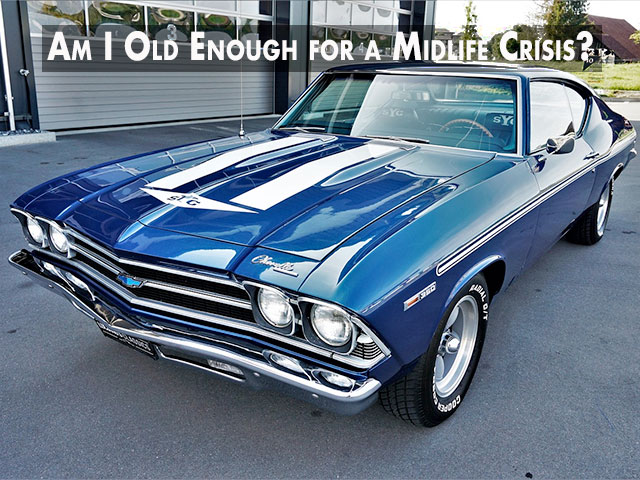Am I Old Enough for a Midlife Crisis?
It was a warm, sunny afternoon, and I was walking through the center of downtown as I often do. A beautifully refurbished classic muscle car pulled up to the red light, with music blasting and its convertible top down. In the driver’s seat sat an older man, probably in his late 50s or early 60s, with slicked-back white hair and wearing expensive designer sunglasses. The light turned green, he revved his engine ridiculously loud and roared off down the street.
Almost simultaneously, multiple strangers standing on the sidewalk next to me all turned to one another and said the same thing: “Well, he’s going through a midlife crisis!”
What even is a midlife crisis? And what age defines midlife? If the average life expectancy for an adult is now between 75 and 80 years old, that means 35-to-40-year-olds are in this demographic. Yet we typically think of older men (like that driver) as the ones who most commonly experience a midlife crisis.
Rather than debating the age at which someone might experience a midlife crisis, I want to examine some common traits that any of us may experience as we get older. I will cover four this week, and four more next Wednesday.
1. Dissatisfaction
As you get older, there will be times when you look at your life and don’t like it. This could be a sudden overnight realization, or it could be a slow development. This happens for a variety of reasons, but the bottom line is that you become dissatisfied with your story. The lives of others around you seem interesting and attractive in ways that they have not before.
2. Disorientation
As we get older, the ways we have seen and thought about ourselves no longer apply. Often, this is because of a loss of function. That is, many of the principal duties that occupied our time and therefore defined our identity are no longer necessary. When this happens, we often experience a loss of personal identity. “I thought I knew who I was and what I was supposed to be doing, but now I am not so sure.”
3. Discouragement
At some point, you will lose the expectancy, vibrancy, hopefulness, and courage of your youth. Maybe not all of it, and maybe not suddenly, but the older you get, the harder it is to see the world as boundless with potential and possibility! Young people are visionaries and dreamers. While this comes with foolishness and unrealistic expectations, it can also be crushing to wake up to the fact that you long ago put away your naïve dreams and are more cynical than optimistic.
4. Dread
At least in Western culture, we put a high value on physical youth. It’s hard to remain positive about adding wrinkles and losing energy when the media constantly emphasizes physique, health, and endless productivity. When you are young, you live with functional feelings of invincibility, but as you get older, you become growingly aware that your physical clock is ticking every day. Often this results in generalized worry or dread about aging and death.
The Bible reminds us of the value of wisdom that comes with age, and I would remind you to look to the Word of God before listening to the lies of culture:
- “Wisdom is with the aged, and understanding in length of days.” (Job 12:12)
- “Gray hair is a crown of glory; it is gained in a righteous life.” (Proverbs 16:31)
- “The glory of young men is their strength, but the splendor of old men is their gray hair.” (Proverbs 20:29)
As you remember these biblical values, remember that your Lord really does understand everything you face. Remember that he really is with you in every stage and age of life as you age.
Peace is not found in the invincibility of youth. Real peace is only ever found in the presence, power, and grace of the Savior, the King, the Lamb, the I AM.
That peace is yours even when the storms of life and the process of aging create a sense of dissatisfaction, disorientation, discouragement, and dread.
You can live with hope and courage in the middle of aging because you know you are never alone. The I AM inhabits every situation, relationship, and location by his grace.
He is in you. He is with you. He is for you. He is your hope.
A Prayer for Today: God, help me to find hope in you when life seems to be hopeless. The inevitability of getting older can sometimes leave me dissatisfied, disoriented, discouraged, and dreadful, but I know you can give me the strength in your Spirit to be hopeful in you when looking into my future. Lord, you are always present, and I want to live in a way that brings you glory until I enter the glory of seeing you face-to-face. Help me to live with the wisdom of hope. In Jesus’ name, amen.
Discussion Prompt for Children
1. What is the difference between knowledge and wisdom? Why is wisdom important? How can a person gain wisdom? Why should we value people who have wisdom?
2. Who are the people in your life who have wisdom? How can you grow wise from their wisdom?
Reflection Questions
1. What are some common cultural assumptions about age that have permeated your way of thinking about getting older? How have those assumptions made you afraid of aging?
2. How has aging brought you face-to-face with dissatisfaction? Disorientation? Discouragement? Dread? What truths from God’s Word have helped you find hope in the face of dissatisfaction, disorientation, discouragement, and dread?
3. Why is wisdom different from knowledge? In what ways have you overlooked the value of wisdom in your life? How do you think wisdom can bring you comfort?
4. Why is there always hope for the Christian, despite life’s circumstances? How can you live with hope and courage in the middle of aging?

